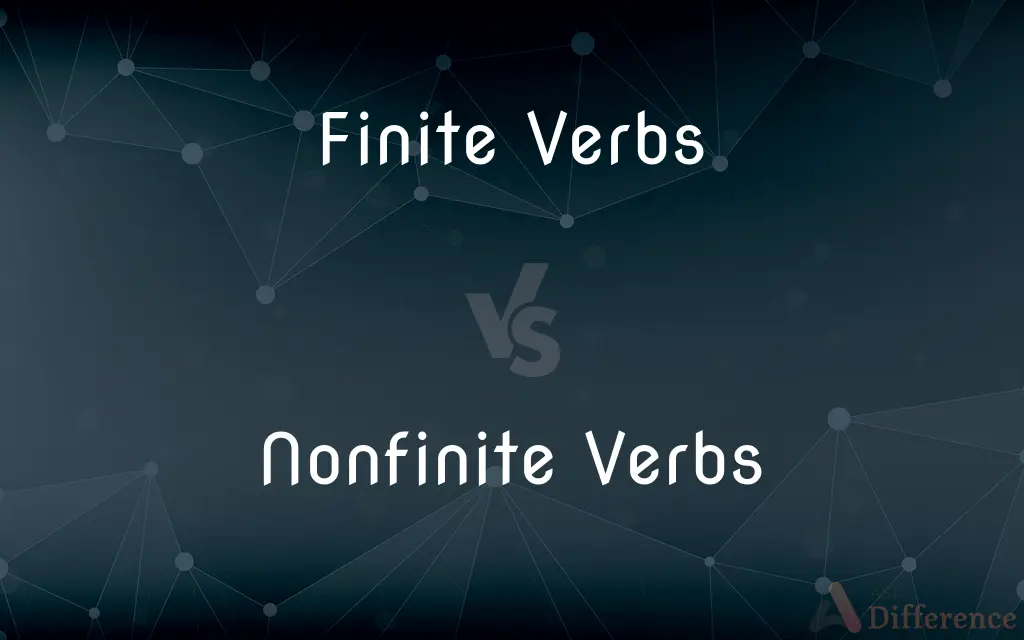Finite Verbs vs. Nonfinite Verbs — What's the Difference?
Edited by Tayyaba Rehman — By Fiza Rafique — Published on December 5, 2023
Finite Verbs change form based on subject & tense; Nonfinite Verbs, like infinitives & participles, don't change regardless of subject or tense.

Difference Between Finite Verbs and Nonfinite Verbs
Table of Contents
ADVERTISEMENT
Key Differences
Finite Verbs are those verbs that have a clear tense, person, and number. They can act as the main verb in a clause. Nonfinite Verbs, on the other hand, don't show tense, person, or number and cannot stand alone as the main verb in a sentence.
In the realm of grammar, Finite Verbs play a pivotal role in indicating the time an action occurs, be it past, present, or future. Nonfinite Verbs, contrastingly, remain unaffected by such temporal shifts and function in auxiliary roles.
A sentence's subject often determines the form of Finite Verbs. This is not the case with Nonfinite Verbs, which remain consistent regardless of the subject they're connected with.
While Finite Verbs can be singular or plural based on the subject, Nonfinite Verbs don't exhibit such variations. They typically come in forms like infinitives, gerunds, and participles.
Examples highlight the distinction: In "She writes often," "writes" is a Finite Verb. In "To write is enjoyable," "to write" is a Nonfinite Verb.
ADVERTISEMENT
Comparison Chart
Tense Variation
Changes based on tense
Doesn't change
Subject Dependency
Alters form based on subject
Remains consistent
Main Role in Sentences
Can be main verb in a clause
Cannot be main verb alone
Forms
Singular, plural, various tenses
Infinitives, gerunds, participles
Example
She writes
To write, writing, written
Compare with Definitions
Finite Verbs
Finite Verbs provide clear information about the action's time.
He studied last night.
Nonfinite Verbs
Nonfinite Verbs don't change with tense or subject.
I love to run.
Finite Verbs
Finite Verbs work in conjunction with a subject.
It rains frequently.
Nonfinite Verbs
Nonfinite Verbs function as infinitives, gerunds, or participles.
Running is fun.
Finite Verbs
Finite Verbs indicate a specific tense.
She runs every morning.
Nonfinite Verbs
Nonfinite Verbs play auxiliary roles in sentences.
He was seen entering the building.
Finite Verbs
Finite Verbs change form based on the subject.
They run every morning.
Nonfinite Verbs
Nonfinite Verbs cannot act as the main verb without assistance.
She is driven by passion.
Finite Verbs
Finite Verbs can stand as the primary verb in a sentence.
Birds sing.
Nonfinite Verbs
Nonfinite Verbs don't provide specific temporal information.
To read is to travel mentally.
Common Curiosities
Why are Finite Verbs essential in sentences?
Finite Verbs are crucial because they indicate the tense and agree with the subject in number and person.
What are Finite Verbs?
Finite Verbs are verbs that change form based on tense, person, and number.
Can Finite Verbs stand alone in a sentence?
Yes, Finite Verbs can act as the main verb in a clause.
How do Nonfinite Verbs function?
Nonfinite Verbs, such as infinitives and participles, don't change form regardless of subject or tense.
What are some examples of Nonfinite Verbs?
Infinitives (to run), gerunds (running), and participles (run, running) are examples of Nonfinite Verbs.
How do Finite Verbs and Nonfinite Verbs relate in complex sentences?
While a sentence might have a Finite Verb as its main verb, it can also contain Nonfinite Verbs serving auxiliary roles.
What role do Finite Verbs play in passive voice?
In passive voice, Finite Verbs are usually formed with a form of "be" plus a past participle.
Are participles always Nonfinite Verbs?
Yes, participles are a type of Nonfinite Verb.
Can Nonfinite Verbs indicate tense?
No, Nonfinite Verbs don't change form to indicate tense.
How can I identify a Finite Verb in a sentence?
Look for verbs that change form based on the subject and tense, like "runs" in "She runs."
Do Finite Verbs always need a subject?
Yes, Finite Verbs work in conjunction with a subject in a sentence.
Do Nonfinite Verbs always start with "to"?
No, only infinitives start with "to." Gerunds and participles are also Nonfinite Verbs but don't use "to."
Are gerunds considered Nonfinite Verbs?
Yes, gerunds are a type of Nonfinite Verb.
How do Nonfinite Verbs function in compound verbs?
Nonfinite Verbs can be part of compound verbs, usually paired with auxiliary verbs, as in "has eaten."
Are there exceptions in the use of Finite Verbs and Nonfinite Verbs?
While general rules apply, as with many grammar rules, there can be exceptions or variations in certain contexts.
Share Your Discovery

Previous Comparison
Ethyl Alcohol vs. Ethanol
Next Comparison
Male Skeleton vs. Female SkeletonAuthor Spotlight
Written by
Fiza RafiqueFiza Rafique is a skilled content writer at AskDifference.com, where she meticulously refines and enhances written pieces. Drawing from her vast editorial expertise, Fiza ensures clarity, accuracy, and precision in every article. Passionate about language, she continually seeks to elevate the quality of content for readers worldwide.
Edited by
Tayyaba RehmanTayyaba Rehman is a distinguished writer, currently serving as a primary contributor to askdifference.com. As a researcher in semantics and etymology, Tayyaba's passion for the complexity of languages and their distinctions has found a perfect home on the platform. Tayyaba delves into the intricacies of language, distinguishing between commonly confused words and phrases, thereby providing clarity for readers worldwide.













































